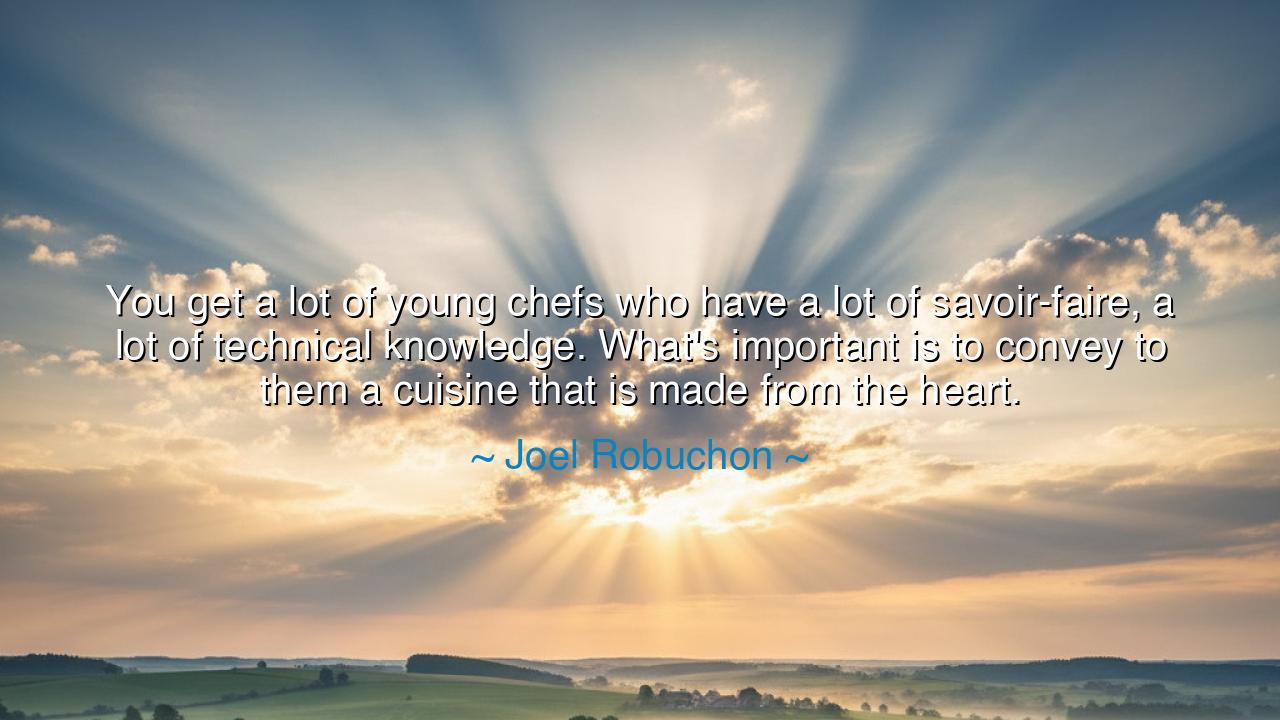
You get a lot of young chefs who have a lot of savoir-faire, a
You get a lot of young chefs who have a lot of savoir-faire, a lot of technical knowledge. What's important is to convey to them a cuisine that is made from the heart.






In the words of Joël Robuchon, one of the greatest culinary masters of the modern age, we find a truth that reaches far beyond the kitchen and into the heart of all human creation: “You get a lot of young chefs who have a lot of savoir-faire, a lot of technical knowledge. What’s important is to convey to them a cuisine that is made from the heart.” Here, Robuchon speaks not merely of food, but of the eternal tension between skill and soul, between the craft that is learned and the spirit that must be felt. His message is simple yet profound — that mastery without emotion is hollow, and that the highest art is born not from the hands alone, but from the heart that beats behind them.
To understand the origin of this insight, we must look to the life of Joël Robuchon himself, a man whose name became synonymous with perfection in the culinary world. Born in France in 1945, he rose from humble beginnings to become one of the most decorated chefs in history, earning over thirty Michelin stars in his lifetime. Yet despite his command of technique — his mastery of flavor, precision, and presentation — Robuchon never forgot that cooking was an act of love. He trained generations of chefs who could reproduce his methods, but he knew that without heart, their dishes would lack life. Technique could create food that dazzled the eye, but only emotion could create food that touched the soul. Thus, this quote was not a critique of knowledge, but a call to infuse it with humanity.
The ancients, too, understood this wisdom. In the age of artisans and philosophers, it was said that every craft was both a science and a devotion. The sculptor who chiseled marble was not simply replicating form; he was revealing the spirit within the stone. Michelangelo, when asked how he created David, replied that he merely “removed what was not David.” His hands obeyed the laws of technique, but his heart followed something greater — intuition, vision, reverence. So too did Robuchon see in the act of cooking not a mechanical process, but a sacred one: a way of transforming raw elements into nourishment, beauty, and connection. For him, a chef without heart was like a poet without passion — technically correct, but spiritually empty.
There is a story told among Robuchon’s disciples that captures this truth. In one of his early kitchens, a young apprentice prepared a perfect plate — balanced, elegant, and precise. Robuchon looked upon it, nodded, and then quietly asked, “But tell me — did you taste it?” The apprentice, flustered, admitted that he had not. Robuchon sent him away and said, “You must never serve what you do not feel. The dish may look perfect, but perfection without love is dead.” That moment became a lesson passed down through kitchens across the world — that the secret ingredient is not butter or wine or salt, but care, the invisible essence that turns sustenance into art.
The meaning of Robuchon’s quote extends beyond the culinary realm. It is a lesson for artists, builders, teachers, and dreamers alike. In every field, there are those who know the techniques — who can measure, design, calculate, and repeat. But true greatness belongs to those who feel. A musician may know every note on the page, yet only when they play with their soul does the melody breathe. A leader may know every strategy, yet only when they lead with empathy do others follow willingly. So it is with cooking, and so it is with life: knowledge gives us control, but love gives us meaning.
Robuchon’s teaching also carries a warning — that in our age of technology and competition, we risk losing the heart behind the craft. Young chefs, like young minds everywhere, are often trained to chase perfection, awards, and mastery of technique. But the master reminds us that perfection is not the goal — connection is. The plate, like any work of art, must speak to the senses and the spirit. And just as one cannot cook well without tasting, one cannot live well without feeling. The heart must always guide the hand, or else creation becomes imitation.
The lesson to be drawn from this is both gentle and powerful: never let knowledge replace sincerity. Learn your craft — master it, refine it, honor it — but never forget why you began. Let your work, whatever it may be, flow from the same place as love: from the center of your being, where skill meets soul. When you cook, create, teach, or build, do it not for applause, but for the joy of giving something real to the world. For what is made from the heart will endure, even when fashions fade and titles are forgotten.
And so, let Robuchon’s wisdom be a guiding flame for all who labor in any art: do not only perfect your hands — awaken your heart. For the hand may feed, but the heart nourishes. The hand may create beauty, but the heart creates meaning. In the end, what we remember of a meal, a song, or a life is not the precision of its making, but the warmth of the love that was poured into it. That is the essence of all true mastery — and the only recipe worthy of being passed down through time.






AAdministratorAdministrator
Welcome, honored guests. Please leave a comment, we will respond soon